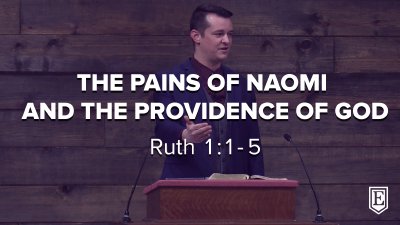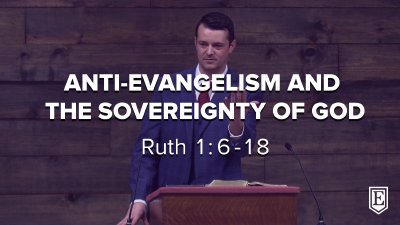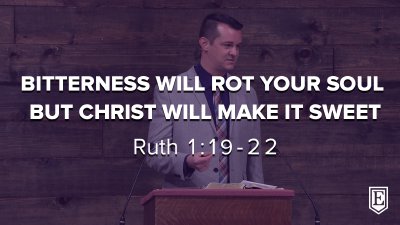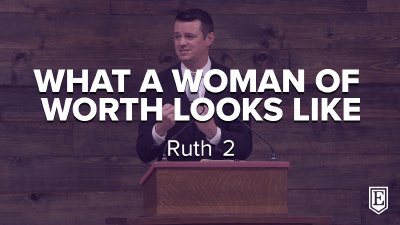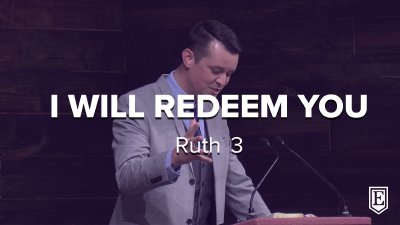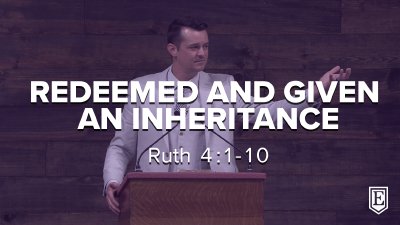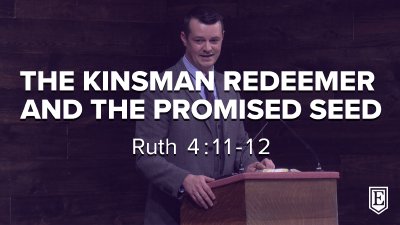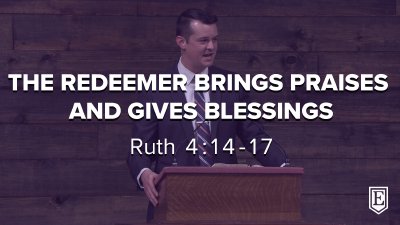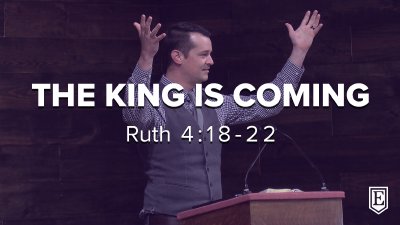

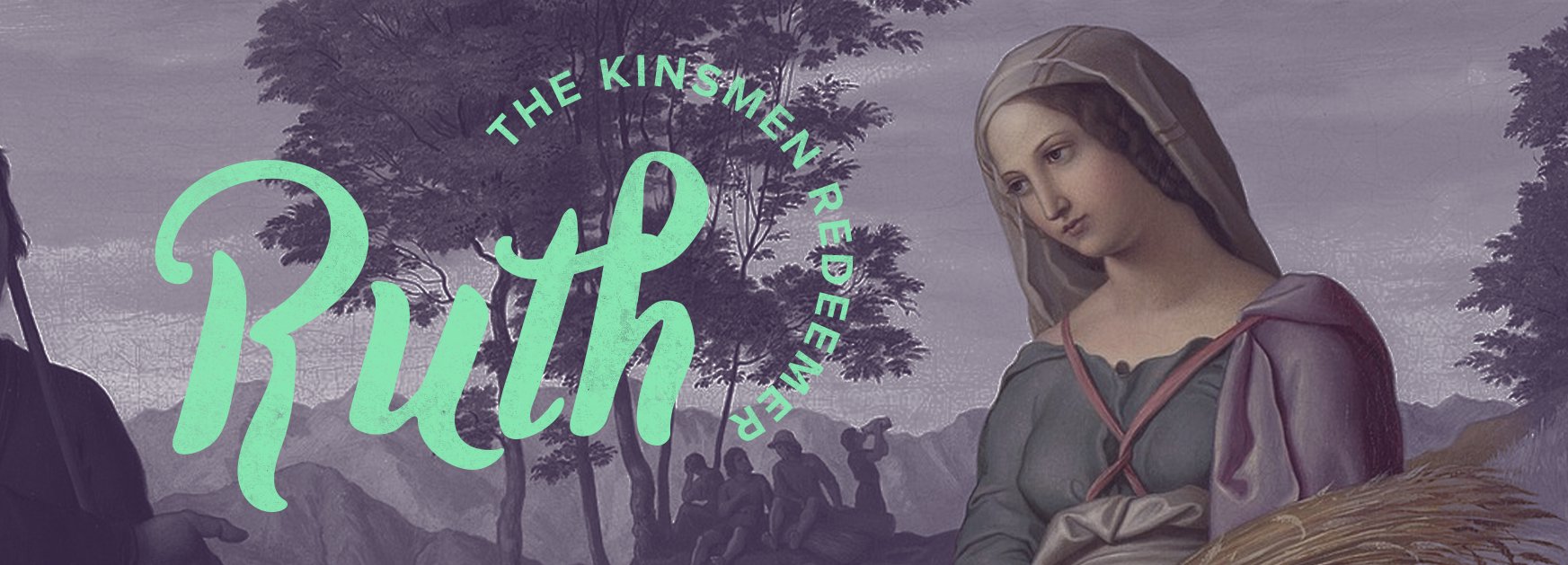
Ruth 2021
The Kinsman Redeemer
THE PAINS OF NAOMI AND THE PROVIDENCE OF GOD: Ruth 1:1-5
February 21, 2021 • Brett Baggett
I. THE PAINS OF NAOMI (explanation) I) Naomi lived in a painful time (v.1a) II) Naomi endured painful discipline (v.1b) III) Naomi was part of a painful decision of faithlessness (v.2) IV) Naomi suffered a painful separation (v.3) V) Naomi experienced two painful marriages (v.4) VI) Naomi endured multiple painful losses (v.5) II. THE PROVIDENCE OF GOD (application) I) Though you may not have any idea what is happening in your life or in the world around you, the LORD is providentially working all things according to the counsel of His will (Ephesians 1:11) II) Though you deserve to end up like Elimelech, Mahlon, and Chilion, in Christ, you will end up like Naomi and Ruth (Romans 6:23) III) Though you may have great pains in this life for your sin, in Christ, God has given you a Redeemer who have the last word in your story (Ruth 4:14) IV) Though you may experience painful discipline from the LORD in this life, in Christ, God disciplines you out of love, so that you may be holy and happy (Hebrews 12:10; Proverbs 3:11-12) V) Though you may be painfully separated from your spouse, in Christ, God has promised never to separate from you (Isaiah 54:4-5) VI) Though you may painfully lose your children, in Christ, God has given you His own Son (Romans 8:32) VII) Though you will experience pain in this life, in Christ, God has promised to work all things together for good (Romans 8:28) DISCUSSION Read verses 1-5. 1. Why did Elimelech take his family to sojourn in Moab? 2. Was this a wise decision or one of faithlessness? 3. What did Elimelech’s sons do according to verse 4 and were these righteous actions? 4 .What happened to Elimelech and his sons according to verses 3 and 5?
ANTI-EVANGELISM AND THE SOVEREIGNTY OF GOD: Ruth 1:6-18
February 28, 2021 • Brett Baggett
I. NAOMI WAS A WEAK WITNESS AND A TERRIBLE EVANGELIST (vv. 6-15) I) Naomi returned to the Promised Land only when its physical blessings seemed better than those in Moab (v. 6-7) II) Naomi told her daughters-in-law to seek blessing and rest among idols (vv. 8-9) III) Naomi forgot there was a redeemer in Bethlehem (vv. 10-13) IV) Naomi convinced Orpah to return to idols and persistently tried to convince Ruth to do the same (vv. 14-15) II. DESPITE THE FAILURES OF NAOMI, GOD SAVED RUTH (v. 16-18) I) Ruth turned away from her idolatrous past (v.16a) II) Ruth embraced the people of God (v.16b) III) Ruth trusted and worshipped the one true God by faith (v.16c) IV) Ruth devoted herself to her mother in law Naomi (v.17-18) III. WHAT DO WE LEARN FROM THIS THAT WILL DO US SOME GOOD? I) If you are a Christian who has been straying and living in sin, you can come home to the LORD and He will receive you II) You must never forget that there is a Redeemer for even you III) When the LORD saves you, you abandon your idolatrous past IV) When the LORD saves you, you embrace Jesus’ people V) When the LORD saves you, you trust and worship Him by faith VI) God saves sinners by grace alone VII) God saves sinners through faith alone VIII) Count the cost of discipleship and see that Christ is worth it DISCUSSION 1. Read verses 6-14. What did Naomi encourage her daughters-in-law to do? Why did she tell them to “turn back”? What did Naomi say concerning how the LORD dealt with her? How did Orpah and Ruth respond? What does it mean that “Ruth clung to her”? 2. Read verses 15-18. Where and to what did Orpah return? What does Ruth say to Naomi and what does she mean? What does this tell us about Ruth, concerning her faith in the LORD?
BITTERNESS WILL ROT YOUR SOUL BUT CHRIST WILL MAKE IT SWEET: Ruth 1:19-22
March 7, 2021 • Brett Baggett
OUTLINE I. Naomi and Ruth returned to the Bethlehem, the House of Bread (v.19) II. Naomi wanted her named changed from Pleasant to Bitter because the LORD had dealt bitterly with her (v.20) III. Naomi looked only at her current circumstance, even misconstruing the story of her life (v.21a) IV. Naomi knew that it was the LORD who had brought calamity on her, though she wrongly understood why (v.21b) V. Despite the bitterness of Naomi, the LORD was working to redeem both her and Ruth (v.22) DISCUSSION Read verses 19-22. 1. How does Naomi react when she comes home to Bethlehem? 2. Did she respond more like Job or Job’s wife? See Job 1-2 3. Why is verse 22 significant in the narrative of the book of Ruth?

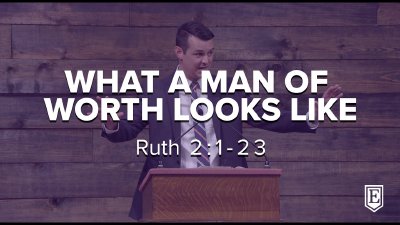
WHAT A MAN OF WORTH LOOKS LIKE : Ruth 2:1-23
March 14, 2021 • Brett Baggett
OUTLINE I. A man of worth has a heart filled with love for God that overflows in his speech (v. 2-4) II. A man of worth cares about the wellbeing of women (v. 5-7) III. A man of worth protects women (v. 8-9) IV. A man of worth is attracted to holiness and faith (v. 10-12) V. A man of worth shows grace, gives comfort, and speaks kindly even above and beyond his duty (v. 13) VI. A man of worth is a hardworking provider (v. 14-18) VII. A man of worth is a redeemer (v. 19-20) VIII. A man of worth perseveres in good works (v. 21-23) DISCUSSION Read verses 19-22. 1. Read verses 1-7. What do we learn about Boaz in these verses? What do we learn about Ruth? What does verse 3 reveal about the loving providence of God? 2. Read verses 8-13. What does Boaz exhort Ruth to do in verses 8-9? What does he promise her? How does Boaz prefigure Christ Jesus here? How did Ruth respond in verses 10 and 13? What reason does Boaz give for showing her favor in verses 11-12? What is the anchor of all these good works, according to the last part of verse 12? 3. Read verses 14-16. What did Boaz say to Ruth? What must Ruth have been thinking? How does Boaz prefigure the Lord Jesus here? 4. Read verses 17-23. What stands out to you in these verses and why? What does Naomi identify Boaz as at the end of verse 20? How does Leviticus 25:25-33, 48-54 shed light on this word “redeemer”? *note they are the same words in Hebrew
WHAT A WOMAN OF WORTH LOOKS LIKE : Ruth 2:1-23
March 21, 2021 • Brett Baggett • Ruth
I. A woman of worth does her duty and trusts in the providence of God (v. 1-3) II. A woman of worth is reverent (v. 4-7a) III. A woman of worth is a hard worker (v. 7b) IV. A woman of worth is grateful to be protected and provided for (v. 8-10, 14-16) V. A women of worth adorns herself with faith and holiness (v. 11) VI. A woman of worth is committed to selfless love (v. 11a, 17-18) VII. A woman of worth is devoted to the LORD above all (v. 11b) VIII. A woman of worth follows the LORD wherever he leads (v. 11c) IX. A woman of worth embraces the LORD’s people (v. 11d) X. A women of worth perseveres in good works (v. 19-23) XI. A woman of worth takes refuge under the wings of the LORD (v. 12-13) DISCUSSION Read verses 19-22. 1. Read verses 1-7. What do we learn about Boaz in these verses? What do we learn about Ruth? What does verse 3 reveal about the loving providence of God? 2. Read verses 8-13. What does Boaz exhort Ruth to do in verses 8-9? What does he promise her? How does Boaz prefigure Christ Jesus here? How did Ruth respond in verses 10 and 13? What reason does Boaz give for showing her favor in verses 11-12? What is the anchor of all these good works, according to the last part of verse 12? 3. Read verses 14-16. What did Boaz say to Ruth? What must Ruth have been thinking? How does Boaz prefigure the Lord Jesus here? 4. Read verses 17-23. What stands out to you in these verses and why? What does Naomi identify Boaz as at the end of verse 20? How does Leviticus 25:25-33, 48-54 shed light on this word “redeemer”? *note they are the same words in Hebrew

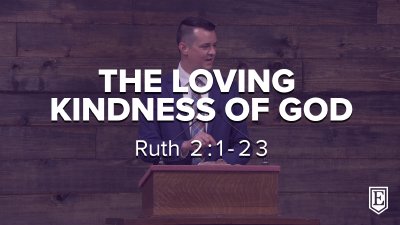
THE LOVING KINDNESS OF GOD : Ruth 2:1-23
March 28, 2021 • Brett Baggett
OUTLINE I) The LORD guided Ruth to the field of Boaz, for His lovingkindness endures forever (v. 1-3) II) The LORD granted repentance and brought revival to Bethlehem, for His lovingkindness endures forever (v. 4) III) The LORD blessed Ruth, for His lovingkindness endures forever (v. 11-12) IV) The LORD healed Naomi of her bitterness, for His lovingkindness endures forever (v. 20) APPLICATION Because of God’s loving-kindness, when you do not understand what He is doing, you can trust in the Lord and rely on your God (Isaiah 50:10) I) I can trust God even when I am in the dark because, if I am in Christ, God has blotted out my transgressions according to His loving-kindness (Psalm 51:1-2) II) I can trust God even when I am in the dark because He has written in His book every single day of my life! (Psalm 136:16) III) I can trust God even when I am in the dark because not even a sparrow falls to the ground apart from my Father’s providential work, and, in Christ, I am of more value than many sparrows! (Matthew 10:29-31) IV) I can trust God even when I am in the dark because He has promised, in Christ, to work all things together for good! (Romans 8:28) V) I can trust God even when I am in the dark because, in Christ, I know His loving-kindness will follow me all the days of my life (AND SO CAN YOU!) VI) I can trust God even when I am in the dark because I know as my substitute Jesus Christ experienced a far greater darkness than I ever will! DISCUSSION Read verses 19-22. 1. Read verses 1-7. What do we learn about Boaz in these verses? What do we learn about Ruth? What does verse 3 reveal about the loving providence of God? 2. Read verses 8-13. What does Boaz exhort Ruth to do in verses 8-9? What does he promise her? How does Boaz prefigure Christ Jesus here? How did Ruth respond in verses 10 and 13? What reason does Boaz give for showing her favor in verses 11-12? What is the anchor of all these good works, according to the last part of verse 12? 3. Read verses 14-16. What did Boaz say to Ruth? What must Ruth have been thinking? How does Boaz prefigure the Lord Jesus here? 4. Read verses 17-23. What stands out to you in these verses and why? What does Naomi identify Boaz as at the end of verse 20? How does Leviticus 25:25-33, 48-54 shed light on this word “redeemer”? *note they are the same words in Hebrew
I WILL REDEEM YOU: Ruth 3
April 18, 2021 • Brett Baggett
I. NAOMI PLOTTED FOR REDEMPTION (vv. 1-5) I) Motive and method both matter; having a pure motive does not excuse promoting or practicing impure actions (vv. 1-5) II) Even God’s people may give you ungodly advice, therefore watch out and test everything with the Word (vv.1-5) II. RUTH PLEAD FOR REDEMPTION (vv. 6-9) I) There must be a cutting off of your old way of life when Jesus redeems you (v. 9) II) See in Ruth a great example of how to approach Jesus in faith (v. 9) III. BOAZ PROMISED REDEMPTION (vv. 10-18) I) Boaz swore an oath to redeem Ruth at any cost! (vv. 12-13) II) Boaz pronounced blessings from the LORD on Ruth (v. 10) III) Boaz quieted the fears of Ruth with promises (v. 11) IV) Boaz cared about the purity of Ruth (v. 14) V) Boaz provided far beyond the needs of Ruth and Naomi (vv. 15-17) VI) Boaz did not rest until Ruth was redeemed (v. 18) APPLICATION CONCERNING CHRIST JESUS I) Like Boaz, The Lord Jesus has swore an oath to Redeem you who believe no matter the cost (Isaiah 59:20, Ephesians 1:7) II) Like Boaz, Christ pronounces blessings from the LORD on His people (Ephesians 1:3-14) III) Like Boaz, Jesus quiets your fears with His promises (Luke 12:32, Matthew 12:20) IV) Like Boaz, The Son of God cares about your purity (Titus 2:14) V) Like Boaz, The Lord Jesus Christ provides far beyond your needs (John 1:16, Romans 5:20) VI) Like Boaz, Christ did not rest until His work of redemption was finished (Hebrews 10:11-13) DISCUSSION 1. Read verses 1-5. What stands out to you and why? How has Naomi’s attitude changed from what we read of her in chapter 1? What exactly seems to be Naomi’s strategy? What does this teach us concerning godly risks? How does Ruth respond? 2. Read verses 6-13. What did Ruth do? What did she say and what did she mean? How did Boaz respond? What does he mean by “worthy woman” and how does Proverbs 31:10 help clarify? *note that what is translated “worthy woman” in Ruth and “excellent wife” in Proverbs are the same Hebrew phrases 3. Read verses 14-18. What did Ruth do in response to Boaz’s exhortation? Why did Boaz say, “Let it be known…” in verse 14 and what does this teach us about his godliness? How does Boaz prefigure Jesus here? Why did Boaz give Ruth “six measures of barley”? How did Naomi respond to Ruth’s news and what do we further learn concerning Boaz here?
REDEEMED AND GIVEN AN INHERITANCE: Ruth 4:1-10
April 25, 2021 • Brett Baggett
OUTLINE I) BOAZ OBEYED THE LAW AND TRUSTED THE LORD—HE WOULD NOT BREAK GOD’S LAW IN ORDER TO REDEEM RUTH (vv. 1-4) II) THE NO-NAMED MAN WAS UNWILLING TO BE THE REDEEMER BECAUSE IT WOULD NOT BENEFIT HIM! (vv. 5-6) III) BOAZ WAS WILLING TO BE THE REDEEMER FOR RUTH’S GOOD AT HIS OWN EXPENSE! (vv. 7-10) DISCUSSION 1. Read verses 1-6. Why did Boaz do as he did in verses 1-2? Why does the first-in-line redeemer not want to act on his right? How do we see the providence of God in this? What do we learn about Boaz in these verses? 2. Read verses 7-10. What does verse 7 teach us concerning the original audience of the book of Ruth? What does Boaz vow in verse 9-10? How does he prefigure Christ here? How is Jesus like Boaz but even better and how does 1 Peter 1:18-19 help clarify?
THE KINSMAN REDEEMER AND THE PROMISED SEED: Ruth 4:11-12
May 2, 2021 • Brett Baggett
OUTLINE I) THE LORD RESCUED HIS PEOPLE THROUGH THE KINSMAN REDEEMER! (11a) II) THE LORD GAVE THE SEED TO REDEEM HIS PEOPLE! (v. 12b) DISCUSSION 1. Read verses 11-12. How did all the people at the gate respond and what blessing did they pronounce upon Ruth and Boaz? Why were Rachel and Leah mentioned? What action did they call Boaz to and why? Why is Perez mentioned and how does Ruth 4:18-22 help clarify? 2. Who gives offspring according to verse 12 and what do we learn from this concerning God’s sovereignty over the womb? Is God sovereign over your womb, women?
THE LORD MAKES A MOTHER: Ruth 4:13
May 9, 2021 • Brett Baggett
OUTLINE I) BOAZ TOOK RUTH AS HIS WIFE (v. 13a) II) BOAZ AND RUTH ENJOYED INTIMACY WITHIN THE COVENANT OF MARRIAGE (v. 13b) III) THE LORD GIFTED RUTH WITH CONCEPTION (v. 13c) IV) THE LORD GAVE RUTH AND BOAZ A SON TO REDEEM THE INHERITANCE (v. 13d) APPLICATION THE LORD IS ULTIMATELY IN CONTROL OF WHO IS A MOTHER, GIVING OR WITHHOLDING CONCEPTION (Gen. 30:1-2) THE LORD CLOSES THE WOMB (Gen. 20:18) THE LORD OPENS THE WOMB (Gen. 29:31) CHILDREN ARE A GIFT FROM THE LORD (Psalm 127:3-5) CHILDREN, EVEN IF THEY ARE CONCEIVED IN THE ACT OF SIN, ARE A GIFT FROM THE LORD (Ruth 4:12) GODLY MOTHERS ARE GIFTS TO CHILDREN (1 Tim. 1:5, 3:14-15; Prov. 31:28-29) BEING A GODLY MOTHER IS ONE OF THE CHIEF WAYS WOMEN REMOVE THE SINFUL STIGMA OF THEIR FIRST MOTHER EVE (1 Tim. 2:14-15) QUESTIONS I. What if you have been forsaken by your mother? (Psalm 27:10) Psalm 27:10 “For my father and my mother have forsaken me, but the LORD will take me in.” II. Seeing that motherhood is a happy thing, what happiness is there for those who will never be mothers? (Luke 11:27-28) Luke 11:27-28 “…a woman in the crowd raised her voice and said to [Jesus], ‘Blessed is the womb that bore you, and the breasts at which you nursed!’ But [Christ] said, ‘Blessed rather are those who hear the word of God and keep it!’” III. What if you want to have children but have not been able to conceive? (Gen. 30:22-23; 1 Sam. 1:20) Genesis 30:22-23 “God listened to [Rachel] and opened her womb. 23 She conceived and bore a son.” 1 Samuel 1:20 “And in due time Hannah conceived and bore a son, and she called his name Samuel, for she said, ‘I have asked for him from the Lord.’” IV. What if my child or children have died in the womb or in infancy? (2 Sam. 12:22-23) 2 Samuel 12:22-23 “22 [David] said, ‘While the child was still alive, I fasted and wept, for I said, ‘Who knows whether the Lord will be gracious to me, that the child may live?’ 23 But now he is dead. Why should I fast? Can I bring him back again? I shall go to him, but he will not return to me.’ DISCUSSION 1. Read verse 13. What did Boaz and Ruth do? What did the LORD do?Who gives conception and how must this direct our actions?
THE REDEEMER BRINGS PRAISES AND GIVES BLESSINGS: Ruth 4:14-17
May 16, 2021 • Brett Baggett
OUTLINE I. THE REDEEMER (vv. 14-15) I) The LORD brings glory and praise to His name through the redeemer Obed (v. 14a). II) The LORD will make the redeemer’s name renowned in Israel (v. 14b). III) The redeemer Obed is a restorer (v. 15a). IV) The redeemer Obed is a nourisher (v. 15b). II. THE REDEEMED (v. 16-17) I) The redeemed Naomi is loved deeply (v. 15c). II) The redeemed Naomi is blessed immensely (vv. 16-17). APPLICATION I) If you have been delivered from your sin and despair through the greater Redeemer, Christ Jesus, you have been blessed immensely. II) If Jesus is your redeemer, you are loved deeply. III) Jesus is a nourishing redeemer. IV) Jesus is a restoring redeemer. V) Now the name of this generous, loving, nourishing, and restoring Redeemer is renowned not only in Israel but to the ends of the earth. VI) The Lord God brings glory and praises to His name through the greater Redeemer, the Lord Jesus Christ. DISCUSSION 1. How did the women respond in verses 14-15 and what do we learn here? 2. Read verses 16-17. How has Naomi’s life changed especially when compared to Ruth 1:20-21? Who were the human actors in this story of redemption? Who was the ultimate actor—that is to ask, what do we learn concerning the LORD’s secret and loving providence in the book of Ruth? What was the child named Obed and who would be his grandson?
THE KING IS COMING: Ruth 4:18-22
May 23, 2021 • Brett Baggett
OUTLINE I. Everything that happened to Naomi, Ruth, and Boaz was providentially guided by the LORD to bring David into the world (Ruth 1-4) II. Everything that happened to Naomi, Ruth, and Boaz was providentially guided by the Lord to ultimately bring Jesus into the world (Ruth 1-4) III. What did the Lord do through David? (2 Samuel 7:8-14) I) I) The LORD RULED His people through David II) The LORD CUT OFF all His people’s current ENEMIES through David III) The LORD made the NAME of David great IV) The LORD brought PEACE to His people through David V) The LORD gave PROTECTION to His people through David VI) The LORD provided REST for His people through David VII) The LORD established an eternal KINGDOM and TEMPLE through David IV. What has the Lord done and what is He doing through Jesus? (Ezekiel 24:23-24) I) The Lord has made Jesus the King II) The Lord has made Jesus the Shepherd DISCUSSION I. Read verses 18-22. Why does the author place this as the conclusion to this book and what does that teach us concerning the point of it being included in the canon of Scripture? How do Matthew 1:1-17 and Romans 15:8-13 help clarify?

